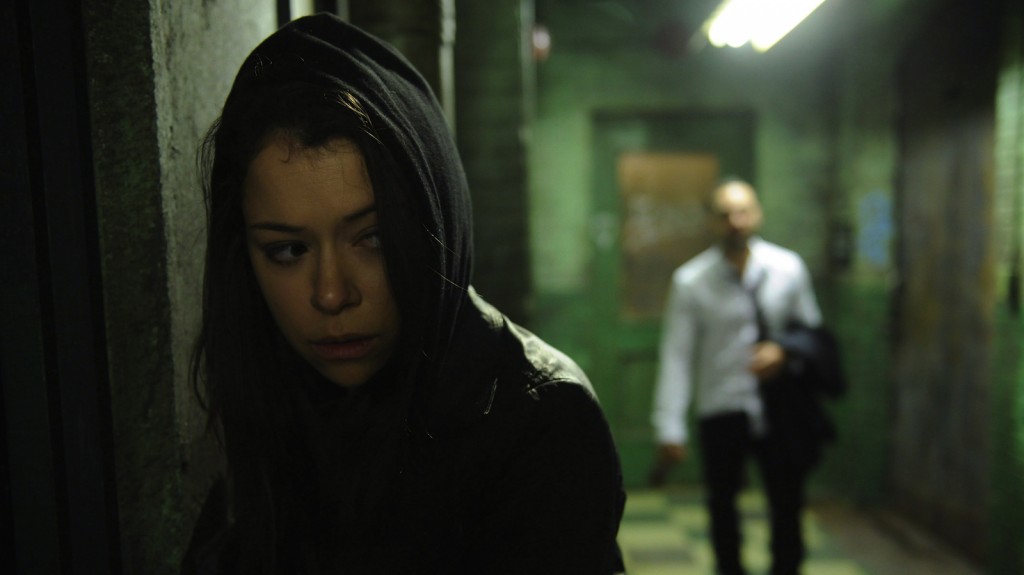Emmy nominations: Still 100% Maslany-free
Jaime Weinman finds an omission to be angry about
This image released by BBC America shows Tatiana Maslany in a scene from “Orphan Black.” TV Guide Canada has taken a straw poll of some of the country’s TV critics to name the best Canadian show of the year. The winner? By an overwhelming result, votes from the 16 critics awarded the prize to the Space series “Orphan Black.” THE CANADIAN PRESS/AP-ho-BBC America, Steve Wilkie
Share

Okay. Emmy nominations, 2014, announced today. Let’s go. We can do this.
Since the Emmy Award nominations usually consist mostly of the same people and shows that got nominated last year, the main thing we commentators can do is find some omissions to be angry about. This year, like last year, the omission people are angriest about is Tatiana Maslany for Orphan Black. Maybe she’ll never get a nomination if she couldn’t get one last year: the buzz for the show was stronger, and there was a feeling that the universal raves for her performance(s) might finally break through the Academy’s famous resistance to science fiction. But it didn’t happen, and this year, the show wasn’t as hot even though the reviews for Maslany were just as spectacular as ever. We can at least console ourselves that she gets snubbed not due to any bias against Canadian shows, but due to a bias against science fiction shows.
Speaking of bias, the other story of the moment is that the Emmy voters have solidified their bias in favour of cable shows, and particular types of cable shows at that. If you count Netflix as sort of honorary cable—and they clearly follow the cable model, from the length of the seasons to the lack of censorship to the type of shows they buy—cable dominates the drama category completely and the comedy category almost completely. The only two ongoing broadcast series to get nominations for the top prize were two elderly comedies, Modern Family (still arguably the favourite to win again, being the “safe” choice for any voter) and The Big Bang Theory. This was a particular snub to The Good Wife, which has been nominated for best drama in the past and aggressively campaigned for the nomination after what many people considered its best season to date. Maybe the aggressiveness of the campaign turned voters off: the theme of the campaign was pointing out that it’s a lot harder to make 22 episodes a season, as most broadcast shows do, than to make 10 to 13 episodes a season. This is true, but it’s not really relevant to judging a show’s overall quality, and the implied insult to cable drama might have put voters off.
Or maybe it didn’t, and the voters have just reached the point where they won’t consider a broadcast drama at all. Or a new broadcast comedy like Brooklyn Nine-Nine, which won the Golden Globe (not that that means much) but couldn’t score any nominations other than a supporting actor nomination for Andre Braugher—one of those actors who gets nominated for virtually everything he does (and always deserves it). That’s a shame, since The Good Wife and probably Hannibal outclassed a number of the nominated shows—especially House of Cards, the epitome of an empty-calorie drama designed to look like it’s a challenging quality show, and Downton Abbey, which has been hard to take seriously for some time now. You can’t blame voters for failing to nominate enough broadcast shows; there are no quotas where it comes to quality. But it does seem to me like the voters identify a very narrow range of dramas and comedies as worthy of the “quality” designation, and ignore the rest, which sends a bad message to the people trying to do great work outside of that narrow box.
But then, the nominations are, in general, an even more perfect distillation of the kind of entertainment Emmy voters tend to gravitate to: dramas about middle-aged men and their angst, comedies about the awkward side of life, and one “dramedy” that will cause arguments over whether or not it should be in the comedy category (Orange is the New Black, which is Netflix’s only first-rate original series, but could have been submitted as either a comedy or a drama). There are the actors who get nominated every year no matter what, such as Melissa McCarthy, Clare Danes, Don Cheadle, and above all, last year’s winner Jeff Daniels, who managed to get another nomination for The Newsroom even as voters had mostly had enough of that show. And there’s a very limited range of style and subject matter that is considered worthy of Emmy consideration.
Well, that’s what awards are valuable for: not to tell us what the best work really is, but to give us a snapshot of what the industry thinks of as the work that should represent it, or the work that industry people wish they could be allowed to do. We can see that if this is a golden age of television, the people who vote on the Emmys think it’s a pretty restricted golden age, distributed among very few outlets and relatively few narrative or stylistic approaches. Are they right? I don’t think so; the good work in TV may actually be more spread out than it’s ever been, with the gems and duds turning up everywhere. So the good news is that this era of TV is very different from the one we see in the Emmy voting. And a lot more fun.